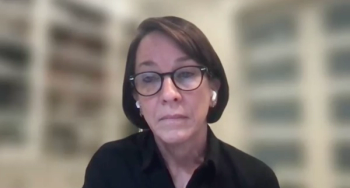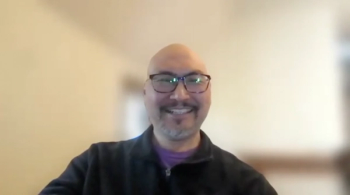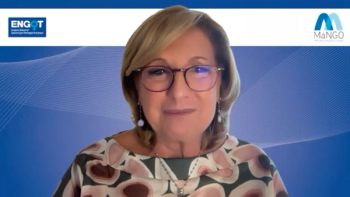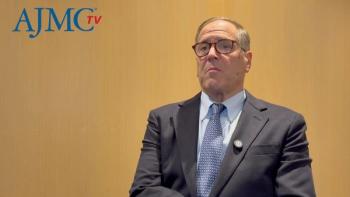
Shayla Bergmann, MD, explains that recombinant von Willebrand factor is both safe and highly effective in controlling perioperative bleeding in children with severe von Willebrand disease.

Shayla Bergmann, MD, explains that recombinant von Willebrand factor is both safe and highly effective in controlling perioperative bleeding in children with severe von Willebrand disease.

Erika Hamilton, MD, reports early trial data showing DB-1305/BNT325, a TROP2-targeted ADC, produced encouraging responses in heavily pretreated TNBC patients.

Ivo Carre, PhD, shares subgroup data that points to potential benefit in younger patients with high-risk MDS.

Andrew Evens, DO, MBA, MSc, shares insights from a study on improving prognostic accuracy for advanced-stage Hodgkin lymphoma.

ICHRAs may help employers and employees manage rising premiums and the loss of extended tax credits, according to expert insights from Ben Light.

New data in high-risk MDS, emerging menin inhibitors in AML, and evolving care needs in rare bleeding disorders set the stage for major ASH 2025 discussions.

Although a cure is likely still a ways off, continuing to pursue long-acting injectable treatments and PrEP is key to reducing cases of HIV.

Prerna Mewawalla, MD, discusses innovative strategies to enhance cancer care access, reduce clinician burden, and improve clinical trial diversity in real-world settings.

Despite the impact of targeted treatment in oncology, much work remains to bring these therapeutics to all patients, says Bhavana (Tina) Bhatnagar, DO.

Peter Voorhees, MD, explains how daratumumab and hyaluronidase-fihj show superior efficacy in delaying progression of MM compared with active monitoring.

With ACA subsidies ending in 2025, Ben Light explains how rising premiums may push individuals toward ICHRAs and reshape employer health coverage strategy.

Explore innovative strategies in dental care that are enhancing access, promoting health equity, and improving community health in Pennsylvania.

Avoiding losses of coverage due to administrative barriers can be done with a focus on making some of the processes automatic.

Lenacapavir and cabotegravir are among the most important advancements in HIV prevention and treatment within the past 10 years.

The uninsured rates may skyrocket when Medicaid work requirements go into effect and if the Affordable Care Act (ACA) subsidies are not extended.

As novel multiple myeloma therapies enter the relapsed and refractory treatment landscape, safety is a key consideration, says Hearn Jay Cho, MD, PhD.

Nicoletta Colombo, MD, PhD, of the University of Milan-Bicocca, discussed key aspects of the KEYNOTE-B96 trial of paclitaxel with bevacizumab and pembrolizumab in ovarian cancer.

Eleanor Perfetto, PhD, explores how most favored nation policy relates to broader drug pricing and cost-effectiveness debates in the US.

Experts discuss the clinical and economic burden of idiopathic pulmonary fibrosis (IPF), emerging clinical data, and strategies to improve patient outcomes.

Svetlana Barbarash, MD, outlines the lack of cardiologists and transplant services in Las Vegas and the policy changes needed to close gender gaps in care.

Men's breast cancer awareness is crucial as it often goes unrecognized, leading to advanced stages at diagnosis, Michael Hassett, MD, explains.

Svetlana Barbarash, MD, explains how better education, digital monitoring tools, and coordinated care can improve arrhythmia detection and outcomes.

Phase 3 ADORING data show tapinarof improves skin, itch, and sleep in children with atopic dermatitis, with similar efficacy and safety in those with comorbidities.

Jonathan Strober, MD, discusses the challenges of diagnosing pediatric myasthenia gravis, especially in seronegative cases, and the importance of antibody testing.

Kavita Nair, PhD, FAAN, shares how new therapies and ongoing clinical trials are reshaping the future of neurological care and offering new hope to patients.

Michael Hassett, MD, explains the evolving landscape of HER2-positive breast cancer treatment and the role of CDK inhibition in personalized therapy strategies.

Phase 3 ADORING data show tapinarof cream delivers early, consistent skin, itch, and sleep improvements in children with atopic dermatitis, with low adverse event rates.

Adam Brufsky, MD, PhD, addresses how the COVID-19 pandemic affected breast cancer screening rates across Pittsburgh.

Urticaria symptom reduction with remibrutinib was linked with improved quality of life and sleep for patients with chronic spontaneous urticaria.

Remibrutinib shows rapid and sustained relief for chronic spontaneous urticaria, offering a promising oral treatment option for patients.

259 Prospect Plains Rd, Bldg H
Cranbury, NJ 08512
© 2025 MJH Life Sciences®
All rights reserved.
